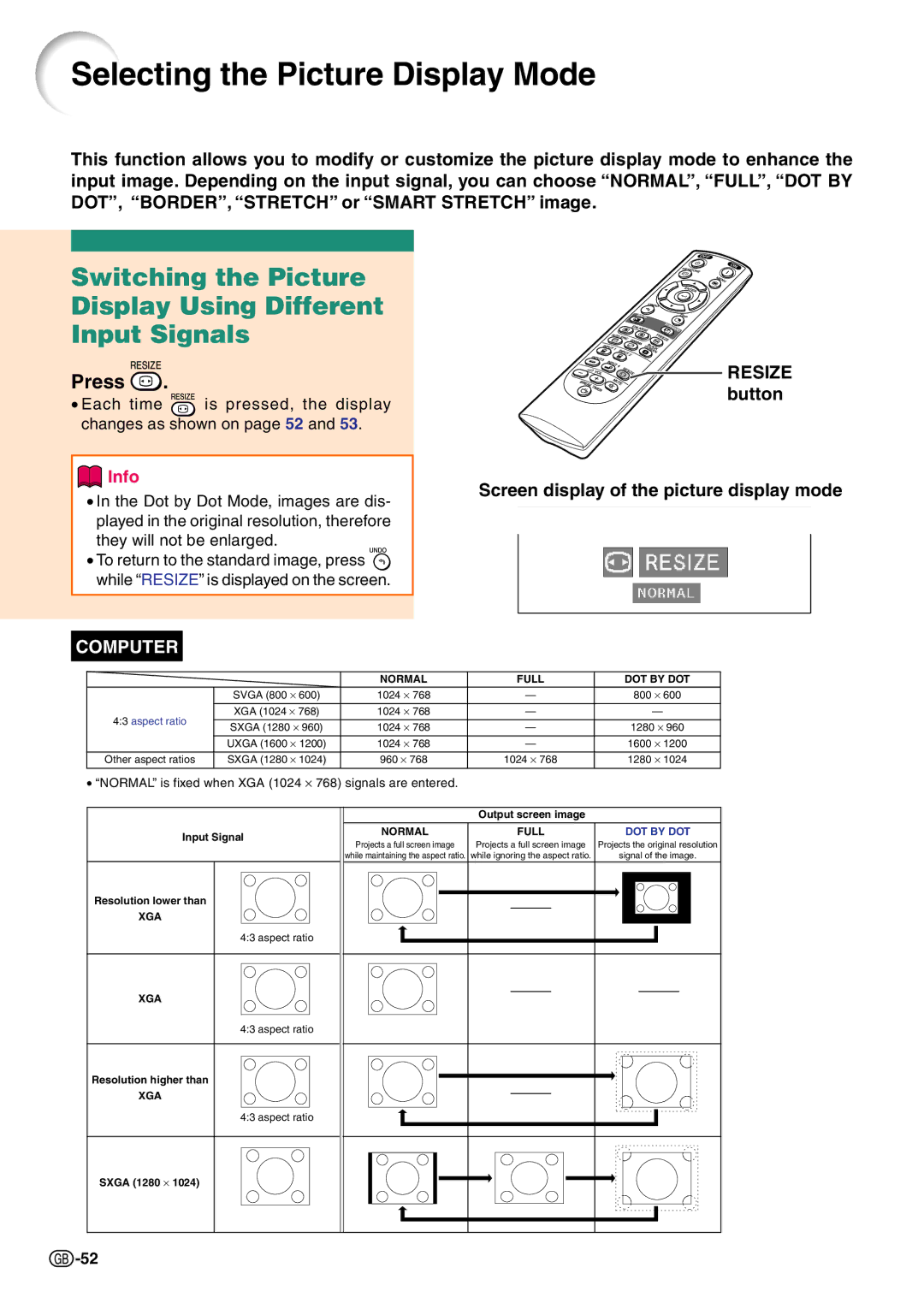
Selecting the Picture Display Mode
This function allows you to modify or customize the picture display mode to enhance the input image. Depending on the input signal, you can choose “NORMAL”, “FULL”, “DOT BY DOT”, “BORDER”, “STRETCH” or “SMART STRETCH” image.
Switching the Picture
Display Using Different
Input Signals
Press  .
.
•Each time ![]() is pressed, the display changes as shown on page 52 and 53.
is pressed, the display changes as shown on page 52 and 53.
 Info
Info
•In the Dot by Dot Mode, images are dis- played in the original resolution, therefore they will not be enlarged.
•To return to the standard image, press ![]() while “RESIZE” is displayed on the screen.
while “RESIZE” is displayed on the screen.



 RESIZE
RESIZE 


 button
button
Screen display of the picture display mode
COMPUTER
|
| NORMAL | FULL | DOT BY DOT | ||
| SVGA (800 ⋅ 600) | 1024 ⋅ 768 | — | 800 | ⋅ 600 | |
4:3 aspect ratio | XGA (1024 ⋅ 768) | 1024 ⋅ 768 | — |
| — | |
SXGA (1280 ⋅ 960) | 1024 ⋅ 768 | — | 1280 ⋅ 960 | |||
| ||||||
| UXGA (1600 ⋅ 1200) | 1024 ⋅ 768 | — | 1600 | ⋅ 1200 | |
Other aspect ratios | SXGA (1280 ⋅ 1024) | 960 ⋅ 768 | 1024 ⋅ 768 | 1280 | ⋅ 1024 | |
•“NORMAL” is fixed when XGA (1024 ⋅ 768) signals are entered.
Input Signal
Resolution lower than
XGA
4:3 aspect ratio
XGA
4:3 aspect ratio
Resolution higher than
XGA
4:3 aspect ratio
Output screen image
| NORMAL |
| FULL |
| DOT BY DOT | ||||||
Projects a full screen image | Projects a full screen image | Projects the original resolution | |||||||||
while maintaining the aspect ratio. while ignoring the aspect ratio. | signal of the image. | ||||||||||
|
|
|
|
|
|
|
|
|
|
|
|
|
|
|
|
|
|
|
|
|
|
|
|
|
|
|
|
|
|
|
|
|
|
|
|
|
|
|
|
|
|
|
|
|
|
|
|
|
|
|
|
|
|
|
|
|
|
|
|
|
|
|
|
|
|
|
|
|
|
|
|
|
|
|
|
|
|
|
|
|
|
|
|
|
|
|
|
|
|
|
|
|
|
|
|
|
|
|
|
|
|
|
|
|
|
|
|
|
|
|
|
|
|
|
|
|
|
|
|
|
|
|
|
|
|
|
|
|
|
|
|
SXGA (1280 ⋅ 1024)
![]() -52
-52
